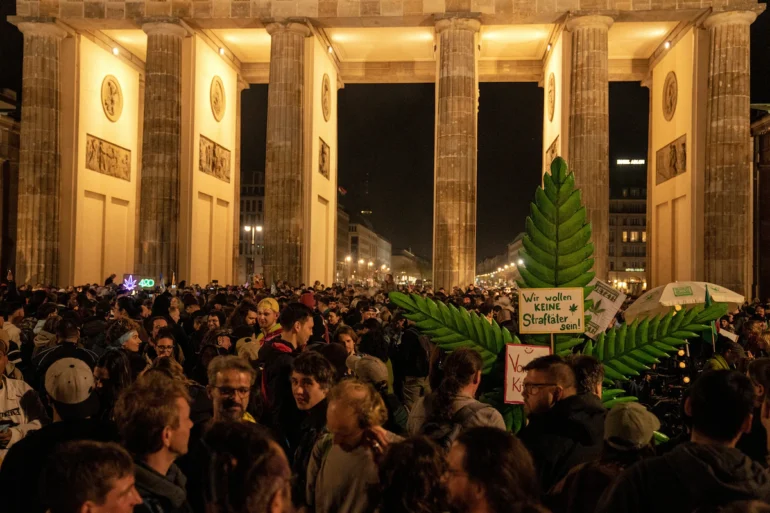Seven years after legalising cannabis for medical use, personal freedom in Germany has reached a new high with all adults now able to grow, possess, and consume the full range of herbs that grow naturally on this planet, with the full legalisation of the cannabis plant.
Thousands of German citizens celebrated the law change by lighting up spliffs at the Brandenburg Gate as the clocks struck midnight between Sunday and Monday this week, as the law came into effect.
“Some German people drink their beer after work. We just want to smoke our weed”, said Dresden resident Marcel Ritschel, who was delighted with the change.
Georg Wurth, director of the German Cannabis Association, has been campaigning for the legalisation of cannabis for decades. “Today, the state is ending decades of police harassment of harmless cannabis users. This is a huge step in the right direction” he said.
Some restrictions remain on the sale and purchase of cannabis, and legislators have ensured that anyone who wants to consume the plant must also learn some biology or get involved in the farming of the herb.
In addition to allowing all adults to carry up to 25 grams at a time – enough for a small group of people to have a very relaxed weekend – the new rules in Germany also allow for adults to grow up to three plants per household, and insists that if not growing it themselves, they must acquire the herb through membership of “cannabis clubs” – cooperatives of up to 500 members who must “actively participate in the cultivation” of the plants.
“The law does not provide for passive membership that is aimed solely at purchasing cannabis,” said the Bundesrat, Germany’s federal legislative body, in a move which some observers said was “very German”.
In addition to the rules on club membership, people won’t be allowed to smoke joints within sight of schools, sports centres or in “pedestrian zones” between 7am and 8pm.
But not everyone is happy with the changes. Alexander Poitz from Gewerkschaft der Polizei (GdP), the German Police Union, is one of them.
“We assume that the black market will be strengthened” he said, claiming that demand would quickly exceed supply, and that he expected criminal networks to “infiltrate” the newly-formed cannabis clubs.
Friedrich Merz, opposition leader and head of the Christian Democratic Union, in a March 24 statement lodged concerns about traffic risks caused by “stoned drivers,” youth health risks and bureaucratic and judicial burdens if past criminal convictions are overturned. He has vowed to overturn the law should his party win in national elections next year.
The legislation was brought by Germany’s ruling coalition, made up of Chancellor Olaf Scholz’s center-left Social Democrats (SPD), the Greens and the Free Democrats. The coalition partners take the view that existing legislation banning cannabis wasn’t achieving its objectives anyway.
“Cannabis consumption was already around yesterday and has been increasing. Now it is coming out of the taboo zone,” wrote Health Minister Karl Lauterbach of the SPD on X, formerly known as Twitter. He said the new legislation is better for addiction help, youth prevention and combating the black market.
Germany joins a growing number of jurisdictions which have either decriminalised, or fully legalised, marijuana in recent years.
Across the European Union (EU), cannabis plants were already legal in Malta and Luxembourg, with it also decriminalised in Austria, Belgium, Croatia, Czechia, Estonia, Italy, Moldova, Netherlands, Portugal, Slovenia, Spain, and Switzerland.
Somewhat bizarrely, the Vatican continues to outlaw the plant, despite professing that it was created by God who is quoted as recommending “every green plant” for consumption, as well as labelling it “good”, in the very first chapter of the Catholic bible.
In North America, marijuana is fully legal in Canada and roughly half of the USA’s fifty states. Legalisation at a federal level in the USA remains elusive, with the strongest opposition coming from the politicians and voters who say they have no personal experience of consuming it.
Across South America, the vast majority of countries have legalised cannabis for medical use, due to the strong evidence of the health benefits which come from the plant. So far, Uruguay is the only state to fully legalise the herb, where it can be bought in pharmacies, up to five grams at a time.
In Paraguay, non-medical use of the plant is technically still illegal, although possession of up to ten grams has been decriminalised since 1988. Despite this, Paraguay is considered the second-largest producer of cannabis in Latin America, after Mexico.
Online, netizens expect the trend of legalisation to continue, and are optimistic for the future. Reddit user weedymcweedface420 commented:
“Every person in the world has felt low at some time in their life. It will be amazing when everyone also has the opportunity to feel high sometimes.”


